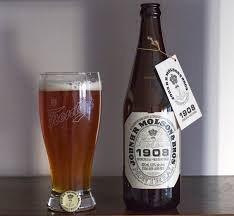It is well known that Molson Brewing has been around a long time. Since 1786 to be exact. So there is definitely some heritage there to be mined. Unfortunately for most of the past two or three generations, the Molson family has been content to put out standard macro lagers that would likely make the original John Molson crinkle his nose and curl his lip in dissatisfaction.
So it was with a fair degree of interest that I noted the release of 1908 Historic Pale Ale. Packaged in a retro 625-ml bottle with a great historic-looking label (I don’t know if it is authentic or a facsimile), it certainly looks historic.
As for the beer, Molson is coming on quite strong in establishing its historical cred, saying it is an authentic re-creation of a 106-year old recipe found in their archives. Their brewmaster, Keith Armstrong, goes as far to say that “to try and replicate the flavours and nuances of the early twentieth century recipe, we went deep into the archives to uncover every last detail behind this historic brew. We sat down with maltsters, barley and hops breeders from across the globe to identify the correct ingredients to mix with Molson’s ancient ale yeast derived from the same primordial strand John Molson used in the 1700s.”
Okay.
Do I believe them? Sorta. I don’t believe they scoured the planet for just the right malt and hops and it seems highly unlikely they still have the historical yeast strain (especially in an un-mutated form). The main source of my skepticism is that in 1908 brewing records were pretty sparse and generic. “X pounds of brown malt”, “a bundle of hops”, “ale yeast” and that kind of thing. No Lovibond (a measure of colour) of the grain, no IBUs (international bittering units) of the final beer and no indication of hop variety, malt type, yeast strain or other key specifications that lead to accurate replication. Such innovations were years away. In short, the brewers simply wouldn’t have enough to work with.
But I do believe this beer is in some way based upon a recipe in the Molson archive. I think it is an honest attempt to re-create an historical beer made by the brewery. It is sincere in its intention, but then the marketing people got a hold of it, and the rhetoric left the stratosphere.
And what of the beer? Here is my take.
It pours hazy medium orange and builds a soft blanket of white head that adds some lacing and a few rocky peaks for accent. The aroma is fairly subdued offering toffee malt, grainy sweetness and touches of citrus and berry fruit. It has a British character to it (which would be right for the era).
The front of the sip has a stalk-y graininess, some toffee and light caramel and a noted fruitiness. I get a touch of lemon, but also some generic yeast fruitiness along with some earthiness. The middle is earthy and a bit muddy and the beer seems to lose its edge a bit. The finish has a moderate, gentle hop character but the beer is not very bitter. It is more about leafy hop flavour than bitterness. It seems like the aim is more to dry the beer out and allow some of the yeast and earthiness to stand out rather than add a puckering bitterness.
Is it a faithful re-creation of a 1908 Molson recipe? Who knows. Does the beer exhibit qualities that I might expect from a 1908 pale ale? Yes. So in that respect I would have to declare the beer a success.
Measuring it as a modern pale ale it falls down on a number of fronts. It is too muddy and flabby, and the bitterness is not sharp enough. But it is unfair to judge it as a modern pale ale. That is not what they were going for.
I tip my hat to the big boys of Molson for giving this a try. I don’t regret trying it and, actually, hope they release other versions loosely based on historic recipes (of which there are likely hundreds). It could be – if they choose to refrain from over-hyping it – a fun mini-project from a behemoth brewery. And that wouldn’t be a bad thing.


March 19, 2016 at 10:57 PM
I was intrigued by this beer from the moment I saw it on the shelf… right through the last sip. I think this is the path that big old breweries should venture down if they hope to achieve a modicum of redemption in the eyes of craft beer aficionados.
March 20, 2016 at 8:27 AM
I agree with Chad. This is a much more constructive way to fight for my dollar than buying small breweries and sending in the accountants. (No offence, accountants, you are great people, but I don’t Think Craft Beer answers well to brutal economic efficiency. )